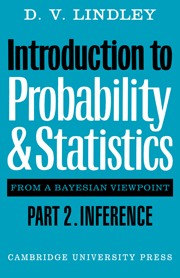Summary
The content of the two parts of this book is the minimum that, in my view, any mathematician ought to know about random phenomena–probability and statistics. The first part deals with probability, the deductive aspect of randomness. The second part is devoted to statistics, the inferential side of our subject.
The book is intended for students of mathematics at a university. The mathematical prerequisite is a sound knowledge of calculus, plus familiarity with the algebra of vectors and matrices. The temptation to assume a knowledge of measure theory and general integration has been resisted and, for example, the concept of a Borel field is not used. The treatment would have been better had these ideas been used, but against this, the number of students able to study random phenomena by means of the book would have been substantially reduced. In any case the intent is only to provide an introduction to the subject, and at that level the measure theory concepts do not appreciably assist the understanding. A statistical specialist should, of course, continue his study further; but only, in my view, at a postgraduate level with the prerequisite of an honours degree in pure mathematics, when he will necessarily know the appropriate measure theory.
A similar approach has been adopted in the level of the proofs offered. Where a rigorous proof is available at this level, I have tried to give it. Otherwise the proof has been omitted (for example, the convergence theorem for characteristic functions) or a proof that omits certain points of refinement has been given, with a clear indication of the presence of gaps (for example, the limiting properties of maximum likelihood).
Information
- Type
- Chapter
- Information
- Publisher: Cambridge University PressPrint publication year: 1965
